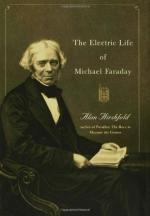|
This section contains 1,373 words (approx. 5 pages at 300 words per page) |

|
Michael Faraday, the British chemist and physicist, came from a poor family and had no formal schooling beyond the elementary level. While a bookbinder's apprentice, he became interested in chemistry and electricity. Faraday took notes on a series of lectures given by Sir Humphry Davy, the leading British chemist, presented them to Davy, and soon afterward, at the age of twenty-one, was appointed laboratory assistant to Davy at the Royal Institution (London). He became director of the laboratory in 1825 and Fullerian professor of chemistry at the institution in 1833. His early scientific work in chemistry included the discovery of several new compounds and the liquefaction of chlorine and other gases. In 1831, Faraday discovered electromagnetic induction, or the creation of electric currents in a conductor by changing currents or moving magnets in the vicinity; this phenomenon is the basis of the electrical generator. This was followed...
|
This section contains 1,373 words (approx. 5 pages at 300 words per page) |

|


